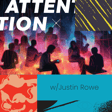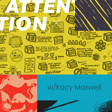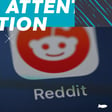Become a Creator today!Start creating today - Share your story with the world!
Start for free
00:00:00
00:00:01

The Difference Between Content Marketing and Building a Media Company w/Kathleen Booth
In this episode, Dan Sanchez talks to Kathleen Booth who is the VP of Marketing Tradeswell.
- How Kathleen is now approaching audience growth.
- What it means to be audience-focused.
- And the one thing you have to accomplish to build a successful media brand.
Thank You For Listening to the Attention Podcast! Don’t forget to hit Subscribe or Follow us on your favorite podcast player so that you never miss an episode! If you want this podcast delivered to you via email, you can subscribe here: https://www.theirattention.com/p/subscribe/
The Attention Podcast is brought to you by Sweet Fish, the podcast agency for B2B brands.
- How Kathleen is now approaching audience growth.
- What it means to be audience-focused.
- And the one thing you have to accomplish to build a successful media brand.
Thank You For Listening to the Attention Podcast! Don’t forget to hit Subscribe or Follow us on your favorite podcast player so that you never miss an episode! If you want this podcast delivered to you via email, you can subscribe here: https://www.theirattention.com/p/subscribe/
The Attention Podcast is brought to you by Sweet Fish, the podcast agency for B2B brands.
Transcript
Introduction & Podcast Insights
00:00:03
Speaker
Welcome back to The Attention Podcast, where you learn how to gain and retain the attention of your buyers to grow an audience.
Content Marketing vs. Media Building
00:00:10
Speaker
I'm Dan Sanchez with Sweetfish, and today I talk to Kathleen Booth, who is the SPP of marketing at Tradeswell, about the difference between content marketing and building a media company.
Strategies for Audience Growth
00:00:21
Speaker
In this episode, we cover how Kathleen is now approaching audience growth, what it means to be an audience-focused company, and the one thing you have to accomplish to build the successful media brand today. All right, let's get into it.
00:00:40
Speaker
Kathleen, welcome to the show. Thanks for having me, Dan. Absolutely. I've been looking forward to this one because we're talking about a topic that is becoming like just near and dear to my heart. And that's the topic of building an company audience first. So I'd love to kick off this conversation about what it means to be audience first for a company these days.
Audience-First Marketing Approach
00:01:02
Speaker
Yeah, I'm super passionate about this topic as well. And I think what it means is that it's all about flipping our understanding of traditional marketing on its head and, you know, being able to look at marketing and understand that while we have all been taught that marketing is about taking an existing product and then finding an audience for it. In reality, it's much more efficient and effective to build an audience and then introduce your product. So that's the simplest way of understanding it.
00:01:31
Speaker
So do you see this coming alongside like other terms like product first, or do you see this as replacing product first for some companies? No, I think in many cases, it's very kind of hand in hand. So you can think of it audience first as temporal, which it certainly can be like you build your audience and then you introduce the product to them. But you can also think of it as a mindset. To me, there are different ways of going about this depending upon what you want to accomplish. If you are a company that's going to build a product,
00:02:01
Speaker
Basically, what this is all about is not waiting until the product is ready to start marketing and to start building your audience. There are some companies that don't start with a product though. I mean, there are a lot of companies these days, you look at the Hustle, Morning Brew, you can look at other media platforms like Gwyneth Paltrow's Goop.
Media Platform Success Stories
00:02:18
Speaker
There's a company called Freightwaves in the freight space. They built media platforms essentially. And then the audiences that they developed gave them the springboard upon which to
00:02:29
Speaker
introduce products later and the products were really developed based on what the audience was telling that company that they wanted so you can come at this from two directions you can come at it from the direction of i have a product that i'm going to need to market why wait until it's ready to go to start to build my audience or i'm going to build an audience and let that audience tell me what the product is that i should build.
00:02:52
Speaker
It's funny is when I think of building an audience, obviously, actually try to think of the content we're creating to build an audience as the product, right? You almost have to think of yourself as being a media company and that your media is the product so that you can build the audience so that you can then launch something more than advertising.
00:03:10
Speaker
because that's how most media companies monetize is just through ads, which I think the hustle and morning brew, I think there was a primary one until they got acquired. But now as an audience for HubSpot, obviously, it makes quite a bit more.
00:03:23
Speaker
Yeah, I mean, you know, when you're in the media business and for years I've heard people say to marketers, like we're all media companies and it's easy. It's an easy thing to say, but understanding what it really means is difficult and not maybe difficult, but perhaps more nuanced. I think there's two dimensions to this and you touched on both of them.
Content as a Product
00:03:40
Speaker
One is thinking of your content
00:03:42
Speaker
as the product itself. That is the product that your audience is purchasing, whether they're using money to purchase it or their time and attention. Those are different forms of currency. But then you have another customer, which is your advertisers. If you choose to accept them are sponsors. And for them, your audience is the product. And so it's this cascading effect where your advertisers and sponsors want access to your audience.
00:04:10
Speaker
and to build a high quality audience product you need to have a high quality content product so there's this domino effect that occurs and that's why you have to put your audience first because ultimately the audience is kind of the last link in that chain that's the end product that needs to be of real value to your sponsors and your advertisers or to you as a business like think of yourself as your own sponsor advertiser if you're not taking on.
00:04:36
Speaker
Outside advertising or sponsorship, presumably it's because you have chosen to be the primary advertiser sponsor by sinking your funds into the creation of the media, the audience, etc. So at any rate, what it means is that that audience, you need it to be large and loyal and consistent. And you get that way by producing really great content.
00:04:57
Speaker
Now I've certainly been hearing the media thing for at least 12 years. I feel like I started hearing that first around 2010. And I remember hearing in this beginning of my career and being like, yeah, that's the thing. But what does it really mean? 12 years later, I'm like, are we really doing that though? Because I don't think this is what it looks like to work at a media company necessarily. So with most people doing content marketing, certainly, what do you see the differences is between doing content marketing and actually acting like an in-house media company?
From Product-Centric to Audience-Centric Content
00:05:26
Speaker
Yeah, so there's this continuum, right? And I think you can fall anyplace along the continuum. And for me, if you think of the beginning of the continuum as being like the marketing part of content, you know, when people start with content marketing, they're very often focused on product-centric content, you know, where they're creating blogs that
00:05:46
Speaker
answer questions about the product or are designed to educate about it. And then you sort of evolve in content marketing and you get to the point where you're really still trying to promote a product, but you're doing it via educating your audience. And so that's what I would consider to be more of a full funnel content marketing strategy where you're trying to create content that is addressing the pain points and the needs and the challenges of your audience. But ultimately, it's all designed to head somebody back to your product, right?
00:06:13
Speaker
And then you go further on that continuum and you get to the point where you're really creating content that is about the needs of your audience beyond your product. It might not have anything to do with your product, but it speaks to the day-to-day life
00:06:29
Speaker
the interests, the challenges, and the needs of that audience. And that's where you start to get more into that media company mindset. But then the next step really is, okay, we're creating this content, but how do we productize it? And what media companies do really well has a couple of things.
00:06:45
Speaker
Number one, they think episodically. Traditionally, when we think about content marketing, a lot of us just by default think about written content and written content is still very valuable, but there's so much more than that out there. If you think today about how people consume content with Netflix and Hulu and all these other platforms where we go and we binge and a new series comes out and we discover it and we're obsessed, media companies are thinking more and more like that and not just
00:07:12
Speaker
with their shows, if you will. Like when you look at podcasts like Serial, that was episodic. There's also episodic written content. And the thing with episodic shows is they're really good at building audiences and momentum over time. Whereas traditional marketing content, like you might sink a lot of money into a research report or an ebook or a white paper, and very often you get an initial bang for your buck and then it tapers.
00:07:37
Speaker
Media content is the exact opposite. It might start slower, but it builds and builds and builds. And so the long-term value is much higher with media content. So the type of content you're producing is one thing. The other thing is this issue of consistency. And the goal being what media companies do really well is they build a habit amongst their audience.
00:07:58
Speaker
So this is a key point of differentiation, and I just want to stop for a second and say if somebody's listening, this is the part to pay attention to. So with traditional marketing, it's all about getting in front of somebody when they're in their buying journey, right? You want to capture the intention of the in-market buyer.
00:08:17
Speaker
with the media approach it's about building an audience regardless of whether they're in market regardless of whether they currently have a need or they're currently going to buy because the again the audience is the product and so you know eventually how does that translate into product sales for you will eventually that person may have a need
00:08:36
Speaker
or they may know somebody who has a need. And so there's this flywheel that develops through that.
Creating Habit-Forming Content
00:08:41
Speaker
But the idea here is to develop a habit amongst your audience that they're coming back to your site, they're consuming your content, whether they are in a buying cycle or not. And so that's why you see so many media companies producing really frequent newsletters. You know, like you think of CNN's Five Things, which goes out every day. There are others that do it weekly or maybe two or three times a week.
00:09:02
Speaker
It's all about consistently getting in front of that person and having them make the choice to invest a part of their routine in consuming your content.
00:09:11
Speaker
I love what you said about it being a continuum. There's a spectrum here as far as content marketing and media company goes. On one end, we have product-focused content. On the other end, I'd like to better define what that is. Would you say it's like a media outlet that's focused on all the things your ideal buyer cares about? Is that kind of like what's on the other end?
00:09:35
Speaker
Yeah, so I would almost go back to the whole Simon Sinek start with a why thing, right? Like it's less about product and selling somebody something. And it's more about like, what is something deep in that person that you're appealing to that they're coming to you for? And it could be a problem they want to solve. It could be an aspirational thing. What I mean by that is this.
00:10:00
Speaker
When you think about media companies and people regularly engaging with them, we often think of subscriptions. Subscriptions are something that people purchase because they're looking to consistently get value out of it.
00:10:15
Speaker
Think about your classic newspaper subscription. I'm subscribing because I want to read the newspaper every day. With a subscription, it's transactional, and I'm going to churn as soon as I stop getting value. This is why that habit is so important and why newspapers want to put something in there that makes you coming back every single day. Now, that's one thing you can work towards in your content, but the other thing, the thing that's even more powerful than that,
00:10:40
Speaker
is cause. And so the example I would hold up to illustrate the point I'm about to make is the Washington Post. So the Washington Post has always had a subscription. And when I used to live in Washington, D.C., I subscribed. But there came a point where I didn't have the time in my day to read the full Washington Post. And I thought, I can't keep paying for this. It's crazy. So I stopped subscribing because I was not getting that day to day value. I didn't have that habit. Right. So what the Washington Post did that changed the game for me and for many other readers
00:11:10
Speaker
is they introduced a higher level kind of more mission driven purpose behind the newspaper and they introduced the tagline democracy dies in darkness. And so today, and this is just my media consumption, but today I subscribe to the post and you know what? If I read it once a week,
00:11:29
Speaker
That's a good week, but I will not give up my subscription because it's moved beyond habit now and into I want to associate myself with this bigger mission cause set of values. And so these are two different dimensions to the media play.
00:11:44
Speaker
And I think the most successful media companies are really combining the two. They're building a habit, but they're giving people a higher purpose to aspire to, something that they want to be associated with. And so going back to your question, when you think about what kind of content you're creating along that continuum, you go to that sort of, what is habit forming? What's something I can get somebody to keep coming back for? And then the ultimate is what is some higher purpose that is going to make someone want to be affiliated with my content, whether
00:12:14
Speaker
they're regularly deriving value or not. Makes me think people need to build. I mean, what you're talking about is start with why, but also kind of like Andy Raskin's strategic narrative, but applied to your content, almost like your brand, like your media brand needs to have its own little strategic narrative to get people to care.
00:12:31
Speaker
Yeah, and I think this is why you also see so many media brands creating communities today too, because it's about coalescing people around something that they believe strongly in and that they have an emotional attachment to. Anytime you develop that emotional attachment, it's very powerful.
00:12:48
Speaker
And I've been reading a really interesting book called, I think it's called Cult Brand. And it talks about how when you become part of the most powerful communities, it's not about becoming a part of something else. It's about you feeling more like yourself. So you're identifying with something in that brand, in that community that taps into something that you feel about yourself, but the brand is able to
00:13:15
Speaker
to depict in the broader world, and a good example of that is Harley Davidson. I did a podcast interview lately with somebody who mentioned and talked about this concept and said that the Harley Davidson logo is the number two most tattooed thing in the world, and the number one thing is mom.
00:13:36
Speaker
So the thing about Harley-Davidson that they've done really well is they've tapped into something that people identify within themselves, which is that spirit of freedom, of independence. And they're a part of that community. They consume Harley's content because it makes them feel more like who they think they truly are. And so I think the really good media companies do that. Red Bull is a great example of a brand that is transcended and become a media company.
00:14:00
Speaker
in exactly this way because people see Red Bull's content and they think, oh, that's me inside. I might not be an X Games, you know, competitor, but inside there's a piece of me that like is that radical person who wants to take risks.
00:14:15
Speaker
something aspirational, something they want to be associated with or want people to, you know, be about them, like, or see about themselves. I've noticed like, Outdoors brands like Patagonia and North Face have definitely become that, right? Yeah. Which just makes me think our media channels probably need different branding than our product. Would you say it's better to build two separate brands because they might have different positions?
00:14:37
Speaker
Yeah, I think it depends, honestly. You know, I use the example of Red Bull and it's while they're selling very different things through their media than they are with their drinks. It's all kind of very cohesive from a branding standpoint. But then you have other examples more recently, like HubSpot purchased the hustle.
00:14:56
Speaker
and the hustle isn't changing and it you know if they're keeping the brand extremely separate and that's really because they want they wanted the audience they wanted to preserve the integrity of the brand they didn't want it to seem product associated and so i don't think there's any one right path for everyone you know
00:15:12
Speaker
Spoiler alert, we're doing something at Tradeswall where I just started as head of marketing. I don't know when this is going to air, but probably close to around the time that we're going to have a big announcement about a media property that is going to be separate from our main brand. And for us, that just made sense. And the reason we went that direction is because we really didn't want people to see the media property as captive to the company or to the brand or as a vehicle to push product. Would you think one of the advantages of keeping it separate is it feels a little bit more like earned media than it does owned media?
00:15:43
Speaker
You know, I'm a little skeptical about that only because I think people see through all that stuff. I think at the end of the day, you have to follow through. And if you want it to seem like earned media, you need to really run the media arm of your business like you're running a journalism outlet.
00:16:02
Speaker
and so i think that's what the best brands do i mean equinox fitness launched a magazine and they hired it was i think it was like the fitness editor from i want to say self magazine you know and so a lot of these a lot of these companies that are launching media arms
00:16:19
Speaker
are doing it in this very, very serious way, where they're saying, we're not just going to hire a content marketer and put a new hat on them and say, now you're running a media company. We're going to hire somebody who's come out of professional journalism. A great example that I just saw, which is super exciting, is Recorded Future, one of the largest, most successful cybersecurity companies in the world, has the record, which is their media property. And they hired Dina Temple-Raston, the NPR
00:16:46
Speaker
host to host their podcast. She comes right out of NPR. She's extremely well known, and now she's hosting a business podcast. It's not about cybersecurity. It's about technology. It's fascinating what they're doing. Those are all examples of really forward-thinking brands that are treating this seriously. What would you say some of the steps are for B2B companies specifically could take if they're currently in the game of creating content that's mostly about their products?
Transitioning to a Media Company Mindset
00:17:12
Speaker
Yeah. What steps did they take to becoming a media company?
00:17:16
Speaker
So this is such an important question and I'm so glad you asked it because it's really easy to talk about this and to throw out examples like Equinox Fitness and Recorded Future and HubSpot. And these are all really big companies with massive, massive amounts of money to spend on these strategies. But it's important to understand that you don't need to be large or well-funded to do it.
00:17:39
Speaker
There's a couple of things, again, remembering that it's a continuum and not, you know, a binary you are or you aren't situation. I think the things that you can start to think about as a company are what are the standards around which we create content? Number one, are we just looking at our content strategy as this full funnel approach where it's
00:17:57
Speaker
all eventually geared towards attracting a buyer or are we thinking of our audience as the whole people that they are and are we willing to create content that has nothing to do with our product but that is useful and appealing to our audience. What would get somebody consistently coming back to read our content who may never buy from us?
00:18:21
Speaker
I always talk about the fact that these days buying decisions are made in these walled gardens. As a head of marketing when I need software, I go into my Slack channels and I talk to three other heads of marketing and I say, what are you using? And they give me a list and then I go to those websites. I'm not Googling trying to find software. I'm just going right to the companies that make it based on the recommendations I got. Well, how does that process happen? That process happens because people in these Slack channels
00:18:47
Speaker
who are either current customers of these companies or who aren't customers but have just heard of them are throwing out these names. And so how do you become the name that gets mentioned in the private community? You do that by appealing to people who are not currently in active buying cycles because the person in the active buying cycle isn't coming
00:19:06
Speaker
Google to find you they're coming to their peers so you have to it's almost like you're building an audience of peers so it's what you're publishing and then it's the mindset with which you approach it are you know could you put editorial standards in place that are similar to those that a publication has.
00:19:22
Speaker
Are you taking your content seriously like a journalism outlet would? Do you have a professional editor? Then I guess the last thing is content formats. How can you really start to think about episodic content or other formats of content that will contribute to this habit-forming element that I talked about earlier? What would get somebody coming back multiple times a week to your website? It's not going to just be your full funnel marketing blogs.
00:19:50
Speaker
Ma'am, I almost wonder if to take a step in that direction, they one need to talk about just things that are related to what their audience cares about that may not be related to their product. But it's in the realm. It's broader industry stuff. And maybe talk about it in such a way where it's like they might talk about their competitors somehow. If you're doing a roundup of all the software, if you are doing a roundup of all the things that is included in your tool, it might include everybody instead of just being about you.
00:20:19
Speaker
Yeah, oh, absolutely. I mean, of course, you might wade it a little bit more towards yourself, but you might actually point out that it's hard to be biased, so you might point out your own bias in your own article. Yeah, I would argue that your regular content marketing strategy should incorporate that anyway. That's a very powerful thing you can do.
00:20:35
Speaker
I would say definitely good media companies accept outside content contributions. They have people who guest author. Instead of having their own podcast, they have a podcast network and they take podcasts from other people and make them a part of their strategy. They might curate content. But
00:20:55
Speaker
It's about letting go a little bit and recognizing that to produce something really meaningful, you might not be able to do it all yourself, right? Because if somebody's going to come back to your site every day or multiple times a week, odds are they're looking for a high volume of content. They are going to be discerning. They're not going to read everything that you produce or watch every video you make. And so how do you get to that point of volume? Well, you can do it through
00:21:22
Speaker
contributors, through partners, through freelancers. There's a lot of ways structurally to produce that volume of content. Well, Kathleen, thank you so much for joining me on the Attention Podcast. This has been really insightful for me and I can't wait to think about how to even take this into Sweetfish and execute what we're already doing even better.
Conclusion & Further Resources
00:21:39
Speaker
Where can people learn more about you and learn more about what's going on with TradesWell online? Sure. Well, you can learn more about me on my website, which is kathleen-booth.com. And then TradesWell is just tradeswell.com.
00:21:51
Speaker
Fantastic. Looking forward to seeing what you guys are launching soon. Hopefully around the time this episode goes out. Thanks again for joining me. Thanks, Dan. This was fun. This was fun. Now let's talk about what caught my attention in this interview. Now Kathleen is one of the sharpest marketers I've ever interacted with on LinkedIn, so I'm not surprised that she's ahead of the game when it comes to building an audience and launching an audience-first company.
00:22:16
Speaker
Her biggest insight of the whole podcast was the one that she certainly like raised her hand on and said hold on if you're only gonna take away one thing this is it and I want to elaborate a little bit on it because she said if you're going to build a successful media brand. You essentially need to build a habit forming media brand you know you need to be able to get them to think about you habitually so that they're coming to come check your content all the time the time.
00:22:41
Speaker
not just every once in a while, right? And it kind of makes sense because there's habit-forming products, and the products that are most habit-farming are the ones that get used the most, which are the ones that grow, the ones that get mentioned, the ones that everybody shares with their friends.
00:22:56
Speaker
So how do we do that we mentioned a few ways in the show so i want to repeat those and then talk about a few ways that came to mind and honestly it's a topic that i need to be exploring a little bit more in depth and will probably revisit a solo episode later as i think of more ways to build a habit forming. Content channel so even i'm trying to think about how i can apply to this very podcast so let's go to a few ways you can do that the obvious one is the time of day.
00:23:22
Speaker
doing it in the morning, at noon, dinner, evening, right before bed? Is there a best time for your customers to check in with you? Or is there a time that is kind of interesting? You know, I almost think like, what would a marketing wind down look like? Honestly, I hate listening to that kind of stuff in the evenings, my brain gets going and I can't sleep. But what if it was like a wake up, like marketing in the morning? Or marketing, I remember James and I did a live event once called Marketing at Noon.
00:23:49
Speaker
Time a week also works, morning, Monday marketing, or something like that. Like there's all kinds of little things and little alliteration plays you can do to make it more memorable. So day of the week, I also think there's a place for you to map to an existing daily habit of your customer.
00:24:05
Speaker
I mean, if you're really adventurous, like, what about that moment when you're going to the bathroom, right? And there's, I don't know, there's a minute or two. I mean, okay, that's quite adventurous, but it's a moment nonetheless. What about when they're getting ready, when they're doing their hair, walking their dog?
00:24:21
Speaker
exercising. What kind of moments are your customers having all the time, maybe professionally, that you can play to for your content channel? Maybe you can map to a situation every time they're going out shopping. I know a lot of B2C companies would love that, but since we're talking mostly B2B here, I'm trying to think of ways to create a habit-forming content channel. It's something worth exploring.
00:24:46
Speaker
And I'll certainly be covering it a little bit later in this podcast as I think about how to do that with this podcast.
















